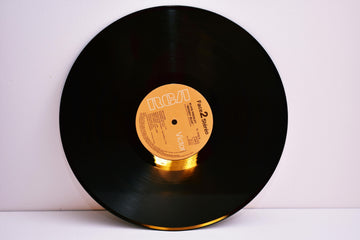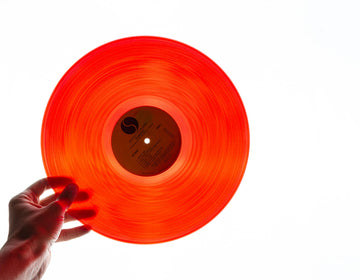You've seen it on the hype sticker of a new release: 'Pressed on 180-Gram Vinyl.' But what does that actually mean? Does it really sound better? Let's find out.
We're witnessing a remarkable revival of vinyl records in today's digital-dominated music landscape. Both new releases and classic reissues are appearing on store shelves worldwide, often featuring the "180-Gram Vinyl" sticker and a higher price tag. As music enthusiasts, we're curious about the value and quality differences these premium records offer.

At www.vinyl.ae, we're passionate about helping music lovers understand the nuances of vinyl collecting. In this article, we'll explore what makes 180-gram vinyl special, examining the claims, myths, and realities behind these heavyweight records.
Key Takeaways
- Understanding the significance of 180-gram vinyl in the music industry.
- The benefits and potential drawbacks of 180-gram vinyl records.
- How 180-gram vinyl affects sound quality and the listening experience.
- The role of 180-gram vinyl in the vinyl collecting community.
- What to consider when purchasing 180-gram vinyl records.
The Resurgence of Vinyl in the Digital Age
In an era dominated by digital music, vinyl records have surprisingly made a significant comeback. We, at www.vinyl.ae, have witnessed a growing interest in vinyl among music enthusiasts who cherish the physical experience of listening to music.
Vinyl's Comeback Story
The story of vinyl's resurgence is multifaceted. It's not just about nostalgia; it's about the unique experience that vinyl offers. The tactile sensation of handling records, the large artwork, and the warm, rich sound all contribute to an immersive experience that digital formats can't replicate.
Many of our customers at www.vinyl.ae describe their vinyl listening sessions as sacred time—moments of deep connection with the music that digital convenience can't match.
The Physical Experience of Vinyl Listening
The physical experience of listening to vinyl is a sensory delight. From the ritual of carefully removing the record from its sleeve to placing it on the turntable, every step is part of the experience. The album artwork, often large and intricately designed, adds a visual dimension to the music.
| Aspect | Vinyl Experience | Digital Experience |
|---|---|---|
| Sound Quality | Warm, rich sound | Clear, but can be sterile |
| Tactile Experience | Handling records, feeling texture | No physical interaction |
| Visual Experience | Large, detailed album artwork | Small, often low-res images |
As shown in the table, vinyl offers a multidimensional experience that combines sound, visuals, and tactile sensations, making it a preferred choice for many music enthusiasts.
Understanding 180-Gram Vinyl: More Than Just Weight
For audiophiles, the weight of a vinyl record is more than just a trivial detail – it's a key factor in the listening experience. The thickness and weight of a record can significantly impact its sound quality and durability.
What Makes a Record "Audiophile Grade"
Audiophile-grade records are designed to provide the highest quality sound reproduction. These records are typically made with high-quality vinyl and are pressed with precision to minimize surface noise and distortion. The 180-gram standard has become a benchmark for audiophile-grade vinyl, offering a balance between weight, durability, and sound quality. Heavyweight vinyl pressings like these are prized for their ability to reduce warping and improve overall sound fidelity.
Standard Vinyl vs. 180-Gram Vinyl: The Physical Differences
The physical differences between standard vinyl and 180-gram vinyl are notable. Standard vinyl records are typically lighter and thinner, which can make them more prone to warping and surface noise. In contrast, 180-gram vinyl records are thicker and heavier, providing a more stable and durable listening experience. The table below highlights the key differences:
| Record Type | Weight (Grams) | Thickness | Warp Resistance |
|---|---|---|---|
| Standard Vinyl | 120-140 | Thin | Low |
| 180-Gram Vinyl | 180 | Thicker | High |
| Heavyweight Vinyl | 200+ | Thickest | Very High |
Beyond 180: Exploring Other Heavyweight Options
While 180-gram vinyl is a popular choice, it's not the only option for audiophiles. Some record labels are pushing the boundaries with even heavier pressings, such as 200-gram or 220-gram vinyl. These super-heavyweight formats offer enhanced stability and durability, making them highly sought after by serious collectors. At www.vinyl.ae, we stock a variety of heavyweight options, allowing collectors to experience the full spectrum of premium vinyl pressings.

Debunking Myths About 180-Gram Vinyl Record Quality
The world of vinyl collecting is filled with myths and misconceptions, particularly when it comes to 180-gram vinyl records. As enthusiasts, we at www.vinyl.ae are passionate about sharing our knowledge and helping you navigate the complex world of vinyl.
Common Misconceptions in the Audiophile Community
Many audiophiles believe that 180-gram vinyl records are inherently superior to their lighter counterparts. However, this isn't always the case. The weight of a vinyl record is just one factor among many that determine its overall quality.
- The assumption that heavier vinyl records are more durable and less prone to warping.
- The belief that 180-gram vinyl records always offer superior sound quality.
The Truth About Sound Quality and Record Weight
The relationship between record weight and sound quality is more nuanced than many people realize. While heavier records can be less prone to warping, the actual sound quality is determined by a complex interplay of factors.

At www.vinyl.ae, we carefully select our vinyl stock to ensure that it meets the highest standards of quality. This includes using virgin vinyl, which is made from pure polyvinyl chloride (PVC) that hasn't been previously used and recycled.
What Actually Determines Vinyl Sound Quality
So, what really determines the sound quality of a vinyl record? Let's take a closer look:
Source Material Quality
The quality of the source material is crucial in determining the overall sound quality of a vinyl record. This includes the mastering process, the quality of the original recording, and the pressing process.
Mastering and Manufacturing Processes
The mastering and manufacturing processes play a critical role in determining the sound quality of a vinyl record. This includes the equipment used, the expertise of the engineers, and the quality control measures in place.
Virgin vs. Recycled Vinyl
The type of vinyl used can also impact sound quality. Virgin vinyl produces records with significantly lower surface noise and fewer imperfections compared to recycled vinyl.
- Virgin vinyl reduces surface noise and imperfections.
- Recycled vinyl may contain contaminants that create pops, clicks, and background noise.
- Premium pressings, including most 180-gram records, typically use virgin vinyl exclusively.
By understanding these factors, you can make informed decisions when selecting vinyl records and enjoy the best possible listening experience.
The Real Benefits of Investing in 180-Gram Vinyl
At www.vinyl.ae, we've seen firsthand the advantages that 180-gram vinyl records bring to music enthusiasts. The primary benefit of these records lies in their superior durability, making them a wise long-term investment for serious collectors. The added weight provides a more stable platform for the stylus, potentially reducing microscopic resonances that can affect sound reproduction.
The increased mass of heavier vinyl records also offers better resistance to warping from heat or improper storage, preserving both their physical integrity and playback quality over decades. This stability on the turntable reduces susceptibility to vibration from footsteps, speaker feedback, or other environmental disturbances that can cause tracking errors.
For collectors who view their record purchases as long-term investments, the additional cost of 180-gram pressings often represents excellent value considering their extended lifespan and resistance to damage. Modern 180-gram vinyl pressings typically receive greater quality control attention during manufacturing, resulting in fewer visual defects and more consistent centering.
The psychological satisfaction of handling a substantial, premium-feeling record enhances the overall experience of vinyl collecting. Many classic albums receiving the 180-gram treatment also benefit from remastering from original tapes, creating a situation where the improved sound often attributed to weight actually comes from better mastering.
For DJs and frequent handlers of records, the durability of heavyweight vinyl provides practical benefits beyond audiophile considerations, with less concern about damage during performance or frequent use. At www.vinyl.ae, we've observed that customers who invest in quality 180-gram pressings tend to treat their entire collections with greater care, creating a virtuous cycle of better preservation and enjoyment of their music libraries.
In conclusion, investing in 180-gram vinyl records is a decision that combines superior durability, sound quality, and a premium collecting experience. Whether you're a serious audiophile or a casual music enthusiast, the benefits of heavier vinyl make it a worthwhile investment for anyone looking to enhance their vinyl collection.
FAQ
Does a heavier vinyl record necessarily mean better sound quality?
Not always. While a heavier record like 180g vinyl can be more durable and less prone to warping, sound quality is determined by factors such as mastering, pressing quality, and playback equipment.
What makes a vinyl record "audiophile grade"?
Audiophile-grade records are made with high-quality materials and manufacturing processes, often involving precise mastering and careful quality control to ensure optimal sound reproduction.
How does the weight of a vinyl record affect its playback?
Heavier records tend to be more stable during playback, reducing the likelihood of warping and vibration that can affect sound quality. However, the quality of the turntable and stylus also plays a significant role.
Are all heavyweight vinyl records created equal?
No, the quality of heavyweight vinyl can vary between manufacturers. Factors such as the material used, the pressing process, and quality control measures all contribute to the final product's sound quality and durability.
Can I expect a significant difference in sound quality between standard and 180g vinyl?
The difference in sound quality can be subtle and depends on various factors, including the recording quality, mastering, and playback equipment. Some listeners may notice a difference, while others may not.
Is 180g vinyl worth the extra cost?
For many music enthusiasts, the durability and potential for improved sound quality make 180g vinyl a worthwhile investment. However, the decision ultimately depends on individual preferences and priorities.






